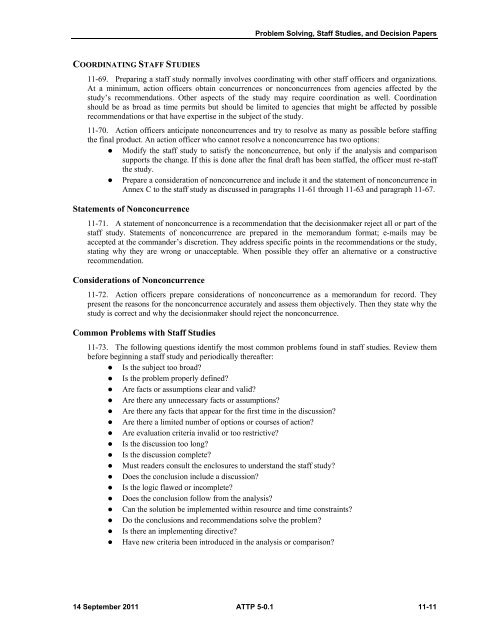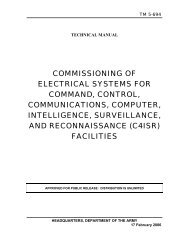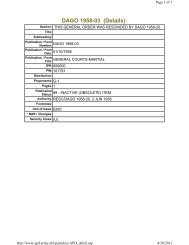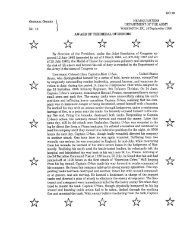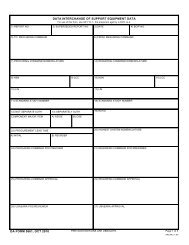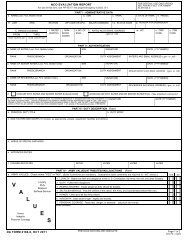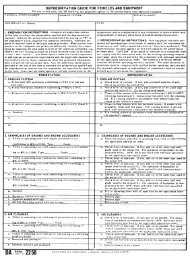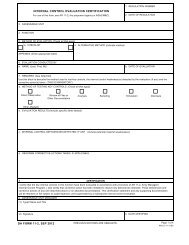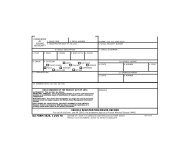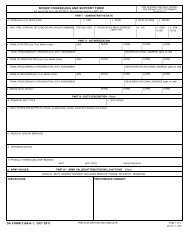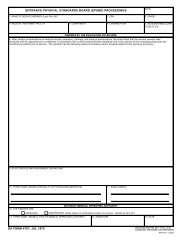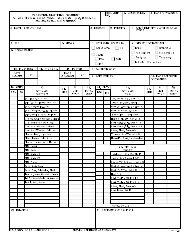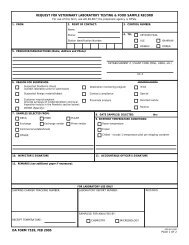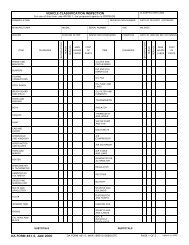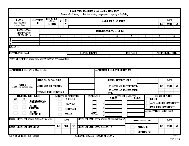ATTP 5-0.1 Commander and Staff Officer Guide - Army Electronic ...
ATTP 5-0.1 Commander and Staff Officer Guide - Army Electronic ...
ATTP 5-0.1 Commander and Staff Officer Guide - Army Electronic ...
Create successful ePaper yourself
Turn your PDF publications into a flip-book with our unique Google optimized e-Paper software.
COORDINATING STAFF STUDIES<br />
Problem Solving, <strong>Staff</strong> Studies, <strong>and</strong> Decision Papers<br />
11-69. Preparing a staff study normally involves coordinating with other staff officers <strong>and</strong> organizations.<br />
At a minimum, action officers obtain concurrences or nonconcurrences from agencies affected by the<br />
study’s recommendations. Other aspects of the study may require coordination as well. Coordination<br />
should be as broad as time permits but should be limited to agencies that might be affected by possible<br />
recommendations or that have expertise in the subject of the study.<br />
11-70. Action officers anticipate nonconcurrences <strong>and</strong> try to resolve as many as possible before staffing<br />
the final product. An action officer who cannot resolve a nonconcurrence has two options:<br />
� Modify the staff study to satisfy the nonconcurrence, but only if the analysis <strong>and</strong> comparison<br />
supports the change. If this is done after the final draft has been staffed, the officer must re-staff<br />
the study.<br />
� Prepare a consideration of nonconcurrence <strong>and</strong> include it <strong>and</strong> the statement of nonconcurrence in<br />
Annex C to the staff study as discussed in paragraphs 11-61 through 11-63 <strong>and</strong> paragraph 11-67.<br />
Statements of Nonconcurrence<br />
11-71. A statement of nonconcurrence is a recommendation that the decisionmaker reject all or part of the<br />
staff study. Statements of nonconcurrence are prepared in the memor<strong>and</strong>um format; e-mails may be<br />
accepted at the comm<strong>and</strong>er’s discretion. They address specific points in the recommendations or the study,<br />
stating why they are wrong or unacceptable. When possible they offer an alternative or a constructive<br />
recommendation.<br />
Considerations of Nonconcurrence<br />
11-72. Action officers prepare considerations of nonconcurrence as a memor<strong>and</strong>um for record. They<br />
present the reasons for the nonconcurrence accurately <strong>and</strong> assess them objectively. Then they state why the<br />
study is correct <strong>and</strong> why the decisionmaker should reject the nonconcurrence.<br />
Common Problems with <strong>Staff</strong> Studies<br />
11-73. The following questions identify the most common problems found in staff studies. Review them<br />
before beginning a staff study <strong>and</strong> periodically thereafter:<br />
� Is the subject too broad?<br />
� Is the problem properly defined?<br />
� Are facts or assumptions clear <strong>and</strong> valid?<br />
� Are there any unnecessary facts or assumptions?<br />
� Are there any facts that appear for the first time in the discussion?<br />
� Are there a limited number of options or courses of action?<br />
� Are evaluation criteria invalid or too restrictive?<br />
� Is the discussion too long?<br />
� Is the discussion complete?<br />
� Must readers consult the enclosures to underst<strong>and</strong> the staff study?<br />
� Does the conclusion include a discussion?<br />
� Is the logic flawed or incomplete?<br />
� Does the conclusion follow from the analysis?<br />
� Can the solution be implemented within resource <strong>and</strong> time constraints?<br />
� Do the conclusions <strong>and</strong> recommendations solve the problem?<br />
� Is there an implementing directive?<br />
� Have new criteria been introduced in the analysis or comparison?<br />
14 September 2011 <strong>ATTP</strong> 5-<strong>0.1</strong> 11-11


